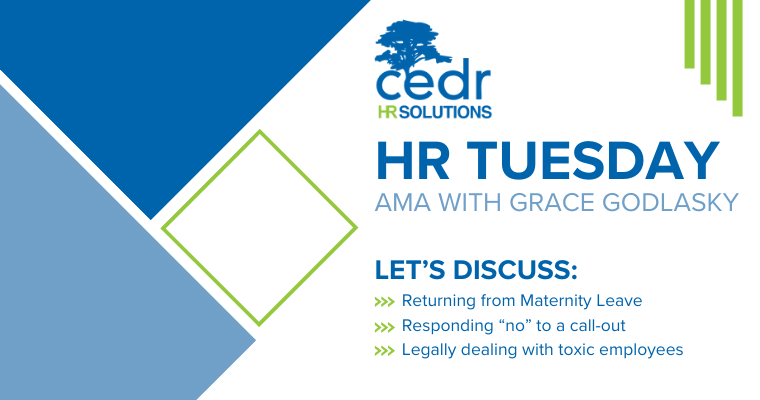
[ad_1]

Please observe, this session is being simulcast on the AADOM Fb Web page, the AADOM LinkedIn Web page, and the AADOM YouTube Channel to view on 5/14/24 at 1:00 pm Japanese.

“I’ve a poisonous worker who likes to gossip” – You Requested, We Answered
Howdy as soon as once more, AADOM tribe! Are you able to imagine it’s already Could? Summer time is a busy time for all of us, however we hope you’re additionally ready to take in the solar and loosen up by some form of physique of water if you get the time!
HR points by no means cease, and also you proved it by submitting a ton of nice questions this month. Hold them coming! We reply them right here and canopy a couple of over on the What the Hell Simply Occurred?! Podcast. Keep in mind, any time you could have an HR situation that both stumps you or need a totally different perspective on find out how to clear up it, submit it right here for Paul and his workforce of specialists that will help you every month throughout HR Tuesday.
In case you’re new right here, as soon as a month, CEDR’s workforce of specialists weigh in and reply three of the HR questions out of your group on AADOM’s HR Tuesday article and reside webcast. Make sure to tune in reside or test the rebroadcast should you can’t make it. For this version, CEDR’s Answer Heart Supervisor Grace Godlasky will go into far more element (with AADOM famous person Heather Colicchio), and reply questions submitted by the viewers within the second!
All the time keep in mind that your each day worker interactions doubtless contain state, federal, or native employment legal guidelines that you will need to think about when looking for the perfect human option to clear up the core downside. We are going to mix the 2 throughout our solutions and show you how to devise some nice resolutions.
Let’s flip it over to the HR Specialists and get to these solutions… Listed here are a few of your finest submissions this month:
- “How can we virtually and legally take care of poisonous workers who ignore fellow teammates, gossip, and fire up drama at work?”
- “How would you deny an worker call-out in the event that they do call-out often and it turns into an issue? And they’re texting the supervisor as an alternative of calling them as required. Some workers are fairly defensive on being approached about this matter, so making an attempt to grasp how this may be approached with utilizing appropriate verbage.”
- “Now we have a full-time worker who’s presently on maternity go away. She want to return to work part-time for a couple of months earlier than changing again to full-time standing. Sadly, we wouldn’t have the necessity for a part-time individual in her place. She has not requested to do that – she has said that’s what’s going to occur – so there’s zero negotiation from her aspect. Ideally, we hoped she wouldn’t return to work as we’ve discovered the workforce operates higher with out her. That mentioned, we don’t wish to violate the FMLA, so we’re OK with having her return to her full-time job. My interpretation of the FMLA is that we’re nicely inside our rights to solely enable her to come back again full-time. Is that this true?”
Let’s Get to the Solutions
Query: “How can we virtually and legally take care of poisonous workers who ignore fellow teammates, gossip, and fire up drama at work?”
The Authorized Perspective: Coping with poisonous conduct within the office requires a stage of understanding of employment legislation, particularly the Nationwide Labor Relations Act (NLRA), which protects workers’ rights to debate work circumstances. Staff are capable of speak about their pay with one another and even complain to one another about work-related issues.
As a result of phrases like “gossip” are very broad, employers have gotten into bother for making common statements like “gossiping shouldn’t be permitted.” The worker could take that to imply they’ll’t speak about who did or didn’t get a bonus that month, since that feels like gossip. But, discussing a bonus program is one thing that workers are legally capable of speak about.
This implies you should watch out to not do or say something that means you might be infringing on their rights.
Now for the Human Strategy: The phrases “poisonous, “gossip,” and “drama” are all fairly broad and don’t reference particular worker conduct. When you’re having an issue with an worker, it’s vital to have the ability to objectively establish what the issue is.
Deal with factual statements, resembling, “She is spending lots of time complaining about her boyfriend when she’s alleged to be sending appointment reminders,” reasonably than, “She is gossiping and inflicting drama.”
From there, it may be extra simply decided if that is conduct that you would be able to deal with, or if the conversations occurring are work-related and due to this fact doubtlessly protected by the NLRA.
REMEMBER, HR TUESDAY DEPENDS ON THE AADOM TRIBE, ASKING GREAT HR-RELATED QUESTIONS! Submit your HR questions for CEDR to debate on the following HR Tuesday LiveCast right here!
Query: “How would you deny an worker call-out in the event that they do call-out often and it turns into an issue? And they’re texting the supervisor as an alternative of calling them as required. Some workers are fairly defensive on being approached about this matter, so making an attempt to grasp how this may be approached utilizing appropriate verbiage.”
The Authorized Perspective: Earlier than taking motion on these points, make sure that your individual insurance policies are compliant with state and native legislation. If you’re topic to any legal guidelines surrounding paid break day, resembling a state-mandated sick go away legislation, there could also be strict parameters you should be abiding by by way of discover for an absence, required documentation, and the choice to disclaim using out there paid break day.
The opposite physique of legislation to contemplate is incapacity lodging. If somebody has a sample of callouts which can be or might be associated to a medical want, together with bodily or psychological disabilities in addition to being pregnant, it’s possible you’ll must discover lodging reasonably than self-discipline for unexcused absences.
Absent a sick go away legislation or incapacity lodging requirement, you’d be permitted to educate or self-discipline this individual for attendance points. Your worker handbook or attendance coverage ought to be your first reference level. These insurance policies ought to clearly define the expectations for any relevant guidelines lined above, in addition to reporting absences, together with the tactic (name vs. textual content) and any documentation required.
If an worker shouldn’t be following these procedures, you possibly can deal with it as a coverage violation separate from the difficulty of the frequency of their absences.
Consistency in the way you deal with these conditions is vital, each by way of making use of your insurance policies and in how disciplinary actions are taken towards any worker not adhering to the principles.
Now for the Human Strategy: There are two totally different points right here – workers calling out often and workers not following your insurance policies on find out how to talk with you.
If an worker is asking out often, you possibly can allow them to know that future callouts could also be unexcused and result in corrective teaching, particularly if they’ve already exhausted all their break day advantages. Notably, that is totally different from forcing somebody’s presence at work. Taking extreme break day is an issue, and so long as you persistently deal with that with any worker taking extreme break day, you possibly can take corrective motion with the worker, as much as and together with attainable termination of employment.
Getting an thought of why the individual is asking out can each show you how to spot the authorized points talked about above, however it could additionally show you how to tailor the teaching to one thing that might be simpler for the worker. If the individual is asking out for issues which can be foreseeable, resembling a toddler’s faculty occasion, common automotive upkeep, or journey, you’re going to tailor the dialog round higher planning and communication.
Alternatively, if the individual is asking out for a number of minor sicknesses, your teaching for that situation goes to very totally different. On this case, you’d concentrate on common attendance expectations and impression in your workforce and enterprise.
Lastly, in the event that they aren’t following your name out procedures – deal with that within the second. In the event that they nonetheless get it incorrect the following time, deal with it additional.
Provoke a dialog with the worker to debate the noticed sample of their absences and the non-compliance with the prescribed call-out process. Use the dialog as a possibility to precise the challenges their frequent and last-minute call-outs pose to the enterprise, emphasizing the necessity for reliability and adherence to established insurance policies.
Nonetheless, method the dialog with out looking for to delve into the private causes behind their absences until they provide that info. The aim is to debate the impression of their actions and to encourage a dedication to enhance.
Right here’s a instructed script of what you possibly can say:
“I’ve observed you’ve needed to miss a number of shifts lately, and infrequently, these absences are communicated by way of textual content reasonably than a name as outlined in our coverage. I perceive that sudden conditions can come up, however constant attendance is essential for our workforce’s effectiveness and offering the perfect care to our sufferers. If you’re not right here, particularly with brief discover, it places a pressure on our operations and your colleagues. I would like you to re-commit to being right here in accordance with your schedule. Can we focus on how we are able to obtain this shifting ahead?”
Bonus content material: What the Hell Simply Occurred?! episode 304: Level-Based mostly Attendance Insurance policies
Query: “Now we have a full-time worker who’s presently on maternity go away. She want to return to work part-time for a couple of months earlier than changing again to full-time standing. Sadly, we wouldn’t have the necessity for a part-time individual in her place. She has not requested to do that – she has said that’s what’s going to occur – so there’s zero negotiation from her aspect. Ideally, we hoped she wouldn’t return to work as we’ve discovered the workforce operates higher with out her. That mentioned, we don’t wish to violate the FMLA, so we’re OK with having her return to her full-time job. My interpretation of the FMLA is that we’re nicely inside our rights to solely enable her to come back again full-time. Is that this true?”
The Authorized Aspect of Issues: Most go away legal guidelines, together with the FMLA, require you to carry a ‘place of comparable standing and pay’ for the worker. What this mainly means is that you should give the worker their outdated job again, or as near it as attainable. What it doesn’t imply is that the worker can demand a unique place or create their very own place upon return from go away.
That’s not the tip of the story right here, nevertheless. The important thing reality on this query is that the individual is asking to return part-time “for a couple of months” (learn: not perpetually). What this implies is {that a} straight up denial as a result of they’re asking for one thing that’s totally different than their outdated job is probably going not the perfect transfer.
To be able to decide if there may be one other legislation or rule that might require you to entertain this part-time request, we have to dig into why the worker is asking for this part-time work.
There are two widespread solutions for why an worker could want to come again from a maternity go away part-time:
- Situation 1: The worker wants extra time for a private purpose, resembling childcare or private desire.
- Situation 2: The worker has a medical want requiring them to work restricted hours.
In state of affairs one, you actually solely want to contemplate whether or not you might be topic to a legislation that might require ‘child bonding’ or ‘household care’ time. The federal Household and Medical Go away Act (FMLA), which applies to employers with 50 or extra workers, would require that form of go away.
There are different states, resembling California and Colorado, which require related child bonding go away time. If you’re at a dimension, or in a location, the place such a go away is required, you’d wish to see how a lot this individual is eligible for and facilitate intermittent go away (go away that’s taken in smaller chunks, reasonably than in a single lengthy stretch).
In state of affairs two, you should think about a much wider class of legal guidelines, together with the People with Disabilities Act (ADA) and Pregnant Staff Equity Act (PWFA), in addition to state legislation equivalents along with state medical go away necessities.
Additionally, in state of affairs two, it’s doubtless the worker’s part-time request might be facilitated as both intermittent go away from any remaining medical go away stability, or a medical lodging.
What about that hope that she wouldn’t return? It’s vital to proceed cautiously as a result of timing of her go away. In case you wouldn’t have documentation displaying what the problems had been, then self-discipline throughout or quickly after a maternity go away might be seen as discriminatory or retaliatory. Be sure that any employment choices are grounded in documented efficiency points.
Bonus content material: What the Hell Simply Occurred?! episode 502: The Pregnant Employee’s Equity Act.
The Human Strategy: Addressing this example requires a mix of empathy, open communication, and equity. The way you deal with this state of affairs can considerably impression your apply’s tradition and morale.
First, provoke a clear and compassionate dialogue along with your worker. Get her to share why she is making this request.
Whether it is for a private want, and there’s no authorized requirement so that you can lengthen extra go away time to her, clarify the operational constraints and the challenges of accommodating a part-time place if it doesn’t align with the apply’s wants. Be open to discussing her concepts and issues and try to discover a mutually helpful answer.
If her request can’t be accommodated as a result of absence of a part-time position, make clear the explanations whereas expressing your willingness to welcome her again in her full-time capability. Guarantee she understands that the choice is predicated on operational wants, not private elements.
Whether it is for a medical want, you’d proceed with administration of a go away or lodging simply as you’d with every other workforce member.
Lastly, it’s important to contemplate the broader message your actions ship to the remainder of your workforce. Demonstrating flexibility and help for workers throughout important life occasions can bolster morale, loyalty, and the general office tradition. Conversely, making assumptions concerning the worker’s state of affairs or showing to be uncollaborative can result in a notion of unfairness and negatively have an effect on workforce cohesion.
HAVE A QUESTION FOR CEDR? Submit your HR questions for CEDR to debate on the following HR Tuesday LiveCast right here!
[ad_2]
